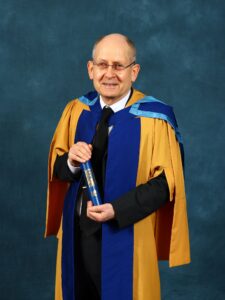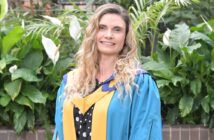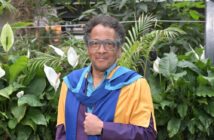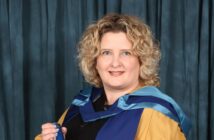One of Britain’s leading science-fiction writers Dr Stephen Baxter has been awarded an Honorary Doctorate by The Open University.
The Liverpool-born writer has captivated generations of science-fiction fans and has worked with esteemed writers such as Arthur C. Clarke, Alastair Reynolds and OU honorary graduate Terry Pratchett.
He originally read mathematics at Cambridge University and later qualified as a chartered engineer through a doctorate in engineering from the University of Southampton and gained an MBA from Henley Management College, now Henley Business School.

Dr Stephen Baxter
He taught mathematics and physics, and then worked in information technology, while beginning his career as an author. His first short story was published in 1986 followed by his first novel ‘Raft’ in 1991.
International success
International success came in the mid-1990s with the publication of ‘The Time Ships’, an authorised sequel to ‘The Time Machine’ by H. G. Wells, timed to coincide with that novel’s centenary.
It won multiple awards in Britain and overseas, including the prestigious Philip K. Dick award, the American science-fiction award given annually.
He is well known for his collaborations with other authors and has worked with Arthur C. Clarke on the trilogy ‘A Time Odyssey’; more recently with Alastair Reynolds on ‘The Medusa Chronicles’; ‘The Long Earth’ series with Terry Pratchett and he is now a vice president of the H.G. Wells Society.
Beagle 2 – mission to Mars
In a connection with The Open University, he reassured the late Professor Colin Pillinger that the name ‘Beagle 2’ would be appropriate for the pioneering Mars mission that flew in 2003.
On receiving the award for his extraordinary contribution to science-fiction writing, Dr Baxter said it was “a great honour” and told how he became captivated by science fiction as a 12-year-old when he picked up a book in his school’s library.
He read a short passage from ‘The City and the Stars’ by Arthur C. Clarke and confessed that it “knocked me out” and inspired him to look into STEM subjects and, ultimately, science fiction.
He said of the book:
“Even then I understood that this isn’t fantasy, it’s a projection into the future; you’ve got a hint of geology and climate change in there; this is a future that isn’t just made up. It’s connected to the present. A possible future, at least.”



